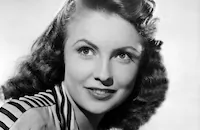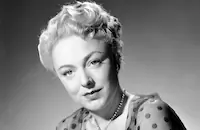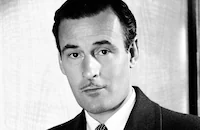Repeat Performance

Brief Synopsis
Cast & Crew
Alfred Werker
Louis Hayward
Joan Leslie
Virginia Field
Tom Conway
Richard Basehart
Film Details
Technical Specs

Synopsis
Just before midnight on New Year's Eve, 1946, Broadway actress Sheila Page shoots her husband Barney and then rushes to see her friend, William Williams. After a distressed Sheila confesses her deed to William, he suggests they talk to John Friday, Sheila's producer. As Sheila and William, an oddball poet, are walking up to John's apartment, Sheila wishes that she could relive the past year, insisting that if she had it to do over, she would not make the same mistakes twice. Upon reaching John's door, Sheila notices that William has disappeared and then gradually realizes that it is now New Year's Day, 1946. After telling a baffled John that she is not going to London, as previously planned, but will remain in New York, Sheila dashes home. Sheila is relieved to see the alcoholic Barney alive and sober and happily embraces him. Later, during their New Year's Day breakfast party, Sheila warns William to avoid a woman named Mrs. Eloise Shaw, as she will have him committed to an insane asylum. No sooner does Sheila issue this advice than William is introduced to Eloise, a vapid socialite who bankrolls struggling male artists. To Sheila's surprise, Paula Costello, the English playwright with whom Barney had an affair during the previous 1946, then crashes the party. Paula, who had previously met Barney in London while Sheila was performing in her play, Say Goodbye , begins a flirtation with Barney, but is rebuffed by the knowing Sheila. Angry at Sheila for chasing Paula away, the now- drunken Barney, a washed-up playwright whose early hit play made Sheila a star, leaves to find Paula. Later, Sheila confides to William that she knows that Barney will fall in love with Paula, begin to drink heavily and then grow to hate her. After vowing to William that she can change her own destiny, Sheila informs Barney that they are going to California. Twelve weeks later, Sheila and a sober Barney are enjoying themselves in Los Angeles when they receive an anonymous play from John. Barney is excited about the play, but as soon as Sheila learns that it is Say Goodbye , she rejects it. Barney and Sheila argue bitterly about the play, and Barney goes out to get drunk. John then arrives, anxious for Sheila to endorse the project, but Sheila refuses to consider doing it until John promises to keep Paula in London during the entire run. While the play is in try-outs in New Haven, however, Barney shows up with Paula. Barney insists that he asked Paula to come only to rewrite the second act and convinces Sheila that Paula is actually in love with John. During the play's successful Broadway run, however, Paula and Barney begin an affair and Barney returns to drinking. At John's Thanksgiving theater party, an intoxicated Barney openly insults Sheila and then kisses Paula on a balcony. When he is discovered by Sheila, Barney stumbles to the front of the balcony and falls over the railing. Later, Sheila is informed that, as a result of the fall, Barney has become paralyzed, but should be able to walk again if he gets complete rest and stops drinking. Still determined, Sheila leaves the play to nurse Barney, but Barney refuses to speak to her. Sheila then learns that William, who took up with Eloise, has been committed to an insane asylum. When she visits the dazed but philosophical William, he states that he now understands about the previous year. On Christmas Eve, after Sheila returns to the theater, Barney invites Paula over. Although Barney is anxious to resume the affair, Paula, having heard that he will not walk again, announces she is going back to London on New Year's Eve. When Sheila finds Paula with Barney, she demands that Paula take her husband to London, but Paula declares that the affair is over. On New Year's Eve, Sheila convinces John to stay with her until after midnight, but then discovers that Barney has left her for Paula. At the docks, Barney, who is now walking with a cane, surprises Paula in her stateroom, but she coldly rejects him. Just before midnight, a hate-filled Barney denounces Sheila for ruining his life and threatens her with his cane. As he is about to strike her, William, having escaped from the asylum, shoots and kills Barney. John then arrives with the police, and as William is taken into custody, he comments that while the details of destiny were changed, the results remained the same.

Director

Alfred Werker
Cast

Louis Hayward

Joan Leslie

Virginia Field

Tom Conway

Richard Basehart
Natalie Schafer
Benay Venuta
Ilka Gruning
Abe Dinovitch
Jean Dutriz

Tim Murdock
Lory Leeman
Mildred Sellers
Mike Lally
Dick Gordon
Bud Townsend
Gale Ronn
Ann Roberts
Valerie Traxler
Patrick Hurst
Raymond Largay
Jean Del Val
Mack Williams
Alf Haugan
Michael Markham
Leland Hodgson
Phillip Morris
Crew
George Antheil
Leon Becker
Walter Bullock
Oleg Cassini
Alfred De Gaetano
Eunice
Bryan Foy
Irving Friedman
J. N. A. Hawkins
Edward C. Jewell
Armor Marlowe
Lew W. O'connell
Jack R. Rabin
Louis H. Sackin
Aubrey Schenck
W. C. Smith
Robert Stillman
George J. Teague
Bud Westmore

Videos
Movie Clip



Hosted Intro
Film Details
Technical Specs

Articles
Repeat Performance
Based on the novel by crime author William O'Farrell, Repeat Performance is a flimsy film noir bolstered by an intriguing conceit. Leslie stars as Sheila Page, an actress who murders her husband just before midnight on New Year's Eve. She's mysteriously transported back in time by one year to relive and possibly alter the events leading up to the murder. The film was directed by Alfred L. Werker who had just come from 20th Century-Fox to work for Eagle-Lion. O'Farrell's story was adapted by Walter Bullock, a songwriter and composer who also moonlighted as a screenwriter. South African actor Louis Hayward plays opposite Leslie as her husband Barney Page, a theatrical producer with a penchant for booze, women and violence. Hayward's career had peaked in the 1930s when he worked for MGM, Warner Bros. and RKO and he had a notable part in Anthony Adverse (1936). He was deeply affected by his time served in WWII, and he never attained the level of success reached by his former wife, actress and director Ida Lupino. According to Noir Alley host Eddie Muller, the role of Barney mirrored Hayward's own personal and professional decline. Other notable cast members include Richard Basehart in his screen debut as William Williams, a poet who time travels with Sheila, as well as Tom Conway, who plays John Friday, a wealthy playboy and rival love interest.
Unfortunately, Repeat Performance was dead in the water before it even premiered. Leslie's contentious battle left a bad taste in the mouths of the powers that be, and they refused to screen Repeat Performance which limited the number of theaters where the film could play. The Hollywood Antitrust Case was just a year away and Warner Bros. still ran their own theaters. Eagle-Lion tried to capitalize on their star as a sexy ingenue with suggestive poster art, including a New York City billboard that depicted Leslie brandishing a gun while wearing an outfit that didn't leave much to the imagination. Leslie was horrified and demanded the billboard be taken down. Eagle-Lion refused.
The film premiered in May 1947 in Zanesville, Ohio, Richard Basehart's home town. It received poor reviews and was not a hit at the box office or with the critics. New York Times film critic Bosley Crowther wrote, "not only is dramatic credibility completely lacking in all this stew but the whole thing is done with such pretension that even the possible salve of ridicule is missed... Joan Leslie plays the tortured female with childish anxiety and Louis Hayward plays her no-good husband in the heaviest melodramatic blackguard style."
Repeat Performance didn't make a splash back in 1947 but it continues to linger in the minds of generations of viewers who have seen it since. At the 2013 Seattle Noir City premiere of the film, Eddie Muller called the film a "film noir version of It's a Wonderful Life (1946)." He went on to say that "over the years [many people] have told me about seeing Repeat Performance when they were young and it stuck in their mind. There is something about the premise of this film..." The introductory voiceover read by John Ireland and the conceit is also a memorable precursor to Rod Serling's hit TV show The Twilight Zone. Repeat Performance has since been remade as the TV film Turn Back the Clock (1989) with Joan Leslie in a cameo role. Leslie was a featured guest at a 2011 Noir City event and by sheer luck a 16mm print purchased by a private collector was made available just in time for the screening. Bad prints of the film have circulated over the years and this newly discovered 16mm print was in much better condition. Repeat Performance has since been restored by the Film Noir Foundation in conjunction with the Packard Humanities Institute.
By Raquel Stecher

Repeat Performance
Quotes
Trivia
Notes
The film opens with a brief voice-over narration. Repeat Performance marked Eagle-Lion's first foray into "big budget" filmmaking. According to Hollywood Reporter news items, Alfred Werker replaced Jules Dassin as director before shooting began, and Louis Hayward replaced Franchot Tone in the lead. Richard Basehart made his screen acting debut in the film. According to the Variety review, Eagle-Lion signed Basehart after he won the New York Drama Critics' award for his performance in the Broadway production of The Hasty Heart. According to Variety, the world premiere of the film was held in mid-May 1947, in Zanesville, OH, Basehart's home town. Eagle-Lion borrowed Virginia Field from Paramount for the production. Although CBCS lists James Horne, Ben Moselle and Phyllis Planchard in the cast, their roles were not included in the completed film. On November 20, 1989, the NBC television network broadcast Turn Back the Clock, a made-for-television adaptation of William O'Farrell's novel, directed by Larry Elikann and starring Connie Sellecca. Joan Leslie appears as a party guest in the television version.















